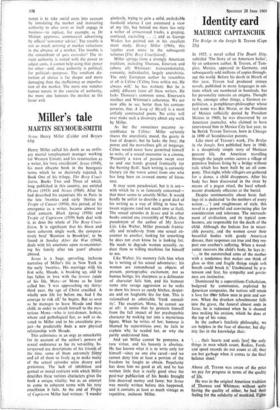Miller's tale
MARTIN SEYMOUR-SMITH
Henry Miller called his death as an ordin- ary mortal (employment manager working for Western Union), and his resurrection as a writer, his 'rosy crucifixion'. Sexus (1949), his most obscene book in the bourgeois terms which he so decisively rejected, is Book One of his trilogy, The Rosy Cruci- fixion, Books Two and Three of which, long published in this country, are entitled Plexus (1953) and Nexus (1960). After' he had described his expatriate life in Paris in the late 'twenties and early 'thirties in Tropic of Cancer (1934), this period, of his emergence as a writer, became almost his chief concern. Black Spring (1936) and Tropic of Capricorn (1939) both deal with it, as does the whole of The Rosy Cruci- fixion. It is significant that his finest and most coherent single work, the compara- tively brief 'Reunion in Brooklyn', to be found in Sunday After the War (1944), deals with his emotions upon re-encounter- ing his family after ten years' absence abroad.
Sexus is a huge, sprawling, inchoate narrative of Miller's life in New York in the early 'twenties. His marriage wig 1hig first wife, Maude, is breaking up, Ad, he has fallen in love with the fenune fatale of his life, Mara—or Mona as he later called her. 'I was approaching my thirty- third year, the age of Christ crucified. A wholly new life lay before me, had I the courage to risk all,' he begins. But as soon as he manages to leave Maude and their child, in order to attach himself to the mys- terious Mona—who is taxi-dancer, lesbian, whore and pathological liar, as well as de- voted to Miller and to his anarchistic pro- ject—he predictably finds a new physical relationship with Maude.
This culminates in an orgy as remarkable for its account of the author's powers of sexual endurance as for its versatility. In- terspersed are descriptions of his friends of the time, some of them extremely AN* and all of them so lively ai to make many of the sexual episodes seem dreary and gratuitous. The lack of inhibition and genteel or moral restraint with which Miller describes these various characters gives the book a unique vitality; but as an attempt to come to coherent terms with his rosy crucifixion it fails. At the end of T'dpic of Capricorn Miller had written: 'I wander aimlessly, trying to gain a solid, unshakable foothold whence I can command a view of my life, but behind me there lies only a welter of crisscrossed tracks, a groping, confused, encircling . . .'; and as George Wickes has pointed out in his excellent short study, Henry Miller (1966), this `applies even more to the subsequent volumes [The Rosy Crucifixion]'.
Miller springs from a strongly American tradition, including Thoreau, Emerson and (above all) Whitman: transcendentalist, romantic, individualist, largely anarchistic. The only European author he resembles at all is Celine (`Celine lives within me. He always will,' he has written). But he is subtly different from all these writers. He lacks Thoreau's common sense, Emerson's intellect and Whitman's coherence. We are now able to see, better than his contem- poraries, that A Song of Myself is a most artfully constructed poem. No critic will ever make such a discovery about any work by Miller.
As for the sometimes uncanny re- semblance to Celine: Miller certainly shares the anarchistic mood, the gaiety in face of despair; but he lacks the fury; the power and the marvellous gift of language.
Celine would never have permitted himself to write, of a sexual encounter in a cinema, `Presently a wave of passion swept over us and our hands groped frantically for the burning flesh'. Such writing is curiously literary (in the worst sense) from one who has long been an avowed enemy of litera- ture.
It may seem paradoxical, but it is sex— with which he is so famously concerned— that most seems to unsettle Miller. It would hardly be unfair to describe a good deal of his writing as a way of filling in time be- tween orgasms (and not much time at that).
The sexual episodes in Sexus and in other books remind one irresistibly of Walter, the pseudonym of the author of My Secret Life. Like Walter, Miller proceeds frantic- ally and mindlessly from one sexual en- counter to another, looking for something he does not even know he is looking for. He needs to degrade women sexually, re- duce them to willing machines for himself to use.
Like Walter, his memory fails him when he is writing of his sexual adventures: his women are remembered as objects of present, pornographic excitement, not as human beings; his sharpness as a delineator of character fails him, and his humour turns into savage aggression as he seeks to show his lovers as randy bitches, desper- ate and on laughable fire for him. This is rationalised as admirable 'frank sensual- ity'. The exception, Mona, he cannot see at all: it seems that he protects himself from the full impact of her psychopathic character by making her into a mysterious figure. When he writes of her, humour is blunted by superstitious awe; he fails to explain why he needed her, or why she partly understood him.
And yet Miller cannot be pompous, a rare virtue, and his honesty is absolute.
He has known what it is to write only for himself—since no one else cared—and we cannot deny him at least a portion of the freedom he fought to obtain. Popularity has done him no good at all, and he has written little that is really good since the post-war publication of his books brought him deserved money and fame; but Sexus was mostly written before this happened, and it contains at least as much vintage as repetitive, inchoate Miller.


































 Previous page
Previous page